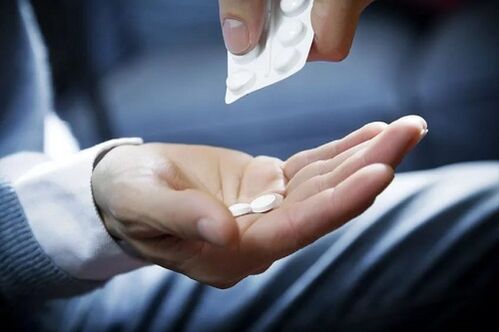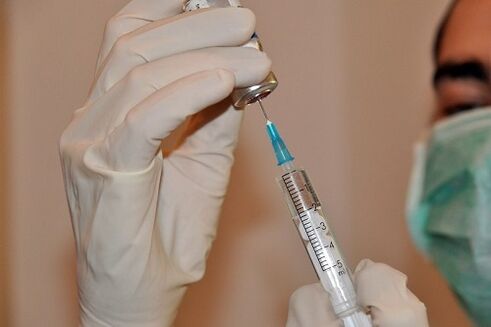Treatment of prostatitis in men involves the use of drugs and physiotherapy. Herbal medicine, glandular massage, acupuncture can be prescribed as additional methods for patients. It is an integrated approach that allows not only to prevent the exacerbation of the disease, but also to get rid of it completely. Drug treatment of prostatitis is always carried out in courses and is prescribed only after a complete examination of the prostate gland.

Drugs in the treatment of prostatitis will be effective only if properly prescribed by a doctor.
fixed assets
As a rule, urologists prescribe different types of drugs to patients who have inflammatory disease of the prostate gland. This allows you to cope with the ailments that occurred in the prostate much faster. To improve his condition, drugs with antibacterial and immunostimulating effects, muscle relaxants, hormonal agents and alpha-blockers are used.
The attending physician prescribes an individual therapeutic regimen for each patient after a thorough study of the ultrasound analyzes and results.

It is impossible to choose drugs for prostatitis yourself, as this can provoke a deterioration not only in the condition of the prostate gland, but also in general well-being.
Drug treatment of chronic prostatitis with antibiotics is not always indicated. If the patient has no symptoms of the disease and at the same time feels normal, this group of drugs may not be prescribed. In this case, chronic prostatitis can be treated with herbal medicines and alpha blockers.
Antibacterial drugs
When chlamydia and other infections are detected, fluoroquinolones can be used, which have a high bioavailability and can penetrate the mucous membrane of the prostate in the shortest possible time.
After prostatitis is detected, the patient is prescribed drugs, including an antibiotic. The regimen is selected by the doctor based on the patient's condition.
In the absence of the desired effect from the use of fluoroquinolones, the doctor may prescribe a course with other drugs. If during the examination laboratory tests have shown the presence of chlamydia, the patient is recommended tetracyclines. Their effectiveness is associated with its rapid penetration into the prostate gland of the active components of the drug and the intrinsic property of the drug to destroy pathological microorganisms as quickly as possible.
With repeated treatment, before treating a recurrence of prostatitis in men with drugs, the doctor devises a new regimen for taking an antibacterial drug, which most often includes lower dosages. If the selected drugs were ineffective, this could mean that they are not suitable for the patient or are prescribed incorrectly.
Preparations with antibacterial effect are indicated only when pathogenic microorganisms have become the causes of prostatitis.
It should be remembered that bacteria are almost always present in one way or another in the human body. During the normal functioning of the immune system, they are inactive and pose no particular threat to health. The weakening of the immune system under the influence of other provoking factors leads to the activation of pathogenic microflora, which penetrates the prostate tissue and leads to acute disease.

The acute stage of bacterial prostatitis requires the use of antibacterial agents. If such treatment is not carried out, the inflammatory processes can go to the bladder, urethra and kidneys. There is evidence of a relationship between bacterial prostatitis and urolithiasis. The absence of antibiotic therapy leads to a chronic form of the disease, which is treated much more difficult and longer.
Principles of appointment
In acute prostatitis, drugs are prescribed immediately after a general examination and questioning of the patient. As a rule, the urologist does not wait for the results of the tests and prescribes a regimen that involves taking macrolides, fluoroquinolones and aminoglycosides in the first days. Less commonly, patients are prescribed erythromycin antibiotics, as such agents are unable to lead to the mass destruction of bacterial microorganisms.
After the urologist has received the test results, the doctor can change the regimen or include other medications in it. The use of only one drug is justified in mild prostatitis. When choosing drugs, it is necessary to take into account the age of the man and the presence of other diseases. If the patient suffers from liver or kidney disease, the doses can be adjusted according to the degree of organ dysfunction.
The patient should inform the urologist of any medications she is taking or has taken relatively recently.
If for some reason a man drank antibiotics, the doctor should take this into account, as such drugs may be ineffective.

If the universal scheme assigned to the patient does not have the desired effect, it is possible to use another one that has a more powerful effect. To enhance the effect, antibiotics are prescribed in the form of injections, so a patient with acute inflammation of the prostate can be hospitalized. Treatment of prostatitis at home is carried out with antibacterial drugs in the form of capsules. In this case, it is extremely important to follow all the rules for receiving such funds. If you stray from the pattern, the therapy may be ineffective. The cancellation or extension of the course is carried out only by a doctor.
Usually, properly selected antibacterial drugs give a positive effect on the third day after the start of taking. If symptoms persist, it is necessary to visit a urologist to review the treatment regimen.

Hormonal preparations and suppositories
A correctly prescribed drug regimen helps to reduce the characteristic symptoms of an inflammatory disease of the prostate gland. First of all, the discomfort that occurs with prostatitis when urinating begins to disappear. When inappropriate medications are used, pain, bladder emptying problems, and erectile dysfunction may persist. In some men, there is a tendency to a gradual deterioration in potency. Most often, in the absence of immunomodulating agents in the treatment regimen, the disease can recur.
In the absence of positive results in the treatment of chronic prostatitis, the patient is prescribed hormonal agents. They help relieve inflammation, restore erection.
Such drugs, although effective, can have many side effects, so they should be used with caution, following the exact dosage recommended by the doctor.
With inflammation of the gland, rectal suppositories can also be used as an adjuvant. Such suppositories are generally well tolerated by patients because they contain natural ingredients. Means based on honey, propolis, a complex with an anti-inflammatory and antiseptic herbal extract have a good effect.
Rectal suppositories help relieve swelling of the gland, reduce pain and normalize blood microcirculation.
Today, in the pharmacy, suppositories or tablet preparations based on sublimated bovine prostate can be purchased. They improve the structure of the prostate tissues, relieve inflammation and help accelerate regenerative processes.
To restore the body and strengthen the immune system, which is often weakened after an inflammatory disease of the prostate gland, the use of a complex containing vitamins and microelements is shown. Patients may also be recommended antioxidant drugs that help prevent the development of hyperplasia and malignancies in the prostate.




























